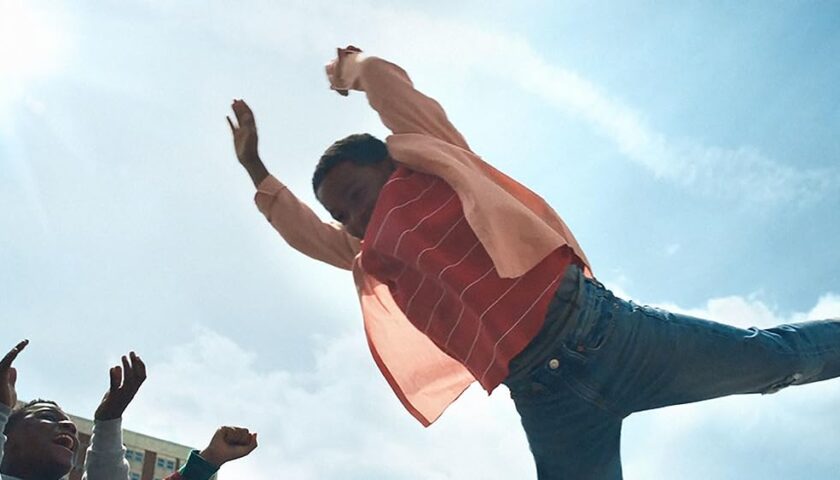241 total views, 1 views today
We Grown Now 2023 Movie Review
If filmmaker Minhal Baig has one thing down, it’s a keen eye for casting. Her breakout sophomore feature “Hala” introduced comedian Geraldine Viswanathan’s dramatic chops, and even her mostly maligned debut, “1 Night,” cast reliable and rising talents like Anna Camp, Isabelle Fuhrmann, and Kyle Allen in juicy roles. Now, her third film — Chicago-set period piece “We Grown Now” — hinges on the wonderful work of two first-time actors (Blake Cameron James and Gian Knight Ramirez). Baig certainly knows who she wants to see on the big screen, but that clear-eyed vision doesn’t always translate to the rest of the production.
Kicking off in the fall of 1992, Baig’s “We Grown Now” is set in and around Chicago’s Cabrini-Green public housing complex (best known, at least in cinematic circles, for its starring role in the “Candyman” horror franchise) and follows a pair of young best friends, Malik (James) and Eric (Ramirez), as they navigate a particularly trying time in their adolescence. Baig’s choice to set her film in such a specific place (one that eventually became synonymous with public housing’s flaws) and during such a specific time period (the first “Candyman” was also released in 1992; within three years, demolition would begin on the complex) is clearly an intentional one, but the filmmaker is unable to leverage that recognition to say anything deeper about what life was actually like for the very people she chronicles.
Coming of age is always hard, but it’s even more difficult in Cabrini-Green, a place built on the hope of urban renewal, only to spend its final years slipping into decline. As we meet them, school is about to start, and Malik and Eric are attempting to soak up the last few moments of their summer. That includes the popular kid activity known as “jumping,” which sees the complex’s many children stacking up mattresses from empty homes and throwing themselves onto the pile, hoping to get some height in the process. They’re both good at it, and they both love it. But when school starts, very real concerns take over.
That transition isn’t smooth — both on screen and within the context of the film. Soon, necessary pieces of information are delivered via stilted exposition, from facts about Malik’s family (at one point, his grandmother, played by S. Epatha Merkerson, starts talking about her hometown of Tupelo as if it’s new info to Malik) to notes on Eric’s charged home life (what happened to his missing mother, for instance).
We do learn that Malik’s home life is a touch more supportive than Eric’s — both his mother (Jurnee Smollett, who also produces) and grandmother are around, plus a kicky kid sister, and dinner is always on the table and well-balanced, while Eric is often grabbing a slice of pizza while his dad (an understated and underutilized Lil Rel Howery) relaxes in front of the TV — and that seems to have freed him up to be a bit more out-there in his personal pursuits. Eric is more pragmatic, but Malik likes to dream, and both his waking and sleeping lives are often interrupted by fantasies — like imagining that the very train that brought up his grandparents from Mississippi is pulling into his kitchen or making Eric picture a cracked ceiling as being full of stars — that offer scant insight into what he is actually thinking.
While the moments focused on the kids’ lives are the best part of the film — James and Ramirez have natural chemistry and are compelling to watch — Baig occasionally falters on that front too. Orienting their place in the world is often handled in jittery fashion (repeated moments in which students recite the Pledge of Allegiance are hammy, as is a “Ferris Bueller”-esque jaunt to the Art Institute), with moments of real emotion (a late-night police raid on the complex is genuinely terrifying and deeply unsettling) only showing up briefly.
Other touches work better. A constant hum of background noise weaves throughout the film — people talking outside, kids yelling, guys playing basketball — all the better to remind the audience how communal this place is, how everyone’s business is inevitably bound up in everyone else’s. Jay Wadley’s score adds a touch of whimsy, while Patrick Scola’s cinematography finds beauty in all sorts of spaces.
What Baig portrays is nothing revelatory: life in Cabrini-Green is beautiful and painful, magical and boring, fraught and fun. It’s sort of like life anywhere, but instead of that concept feeling universal, it feels impersonal, vague, rote. Mostly, it feels undercooked, approached by someone with respect who still doesn’t quite get it. Why Baig — a woman of color from Chicago, yes, but also one who was raised in a rarefied neighborhood and enjoyed an enviable education, including matriculating at Yale — was possessed to take on this story remains to be seen (when the film was accepted into TIFF, she tweeted her pleasure at taking the film back to the place where she had initially pitched it, after being termed an “impossible” film by many, so she seems to have gotten at least some messaging on why this was, at best, an odd fit).
The film’s oft-stated — literally, it’s said repeatedly and then appears in an on-screen postscript — theme is that a place is its people. Places like Cabrini-Green — and the people who make them — are more than worthy of further onscreen explorations, but which people are telling those stories? In the case of “We Grown Now,” the answer seems clear: perhaps not the right ones.
